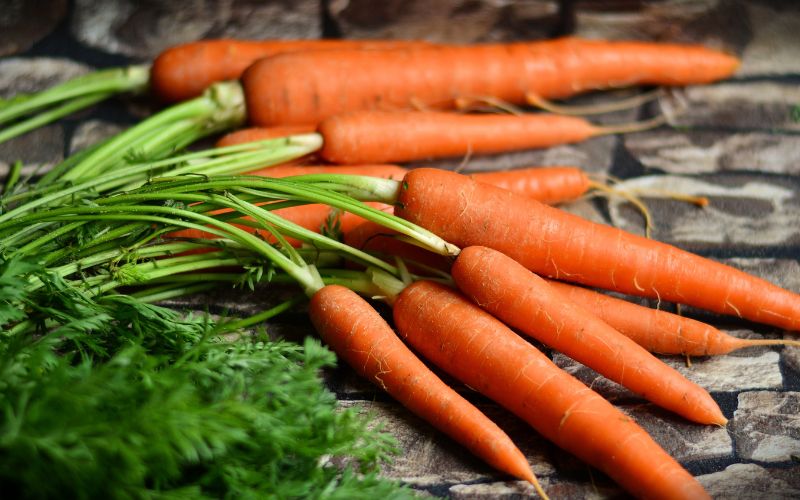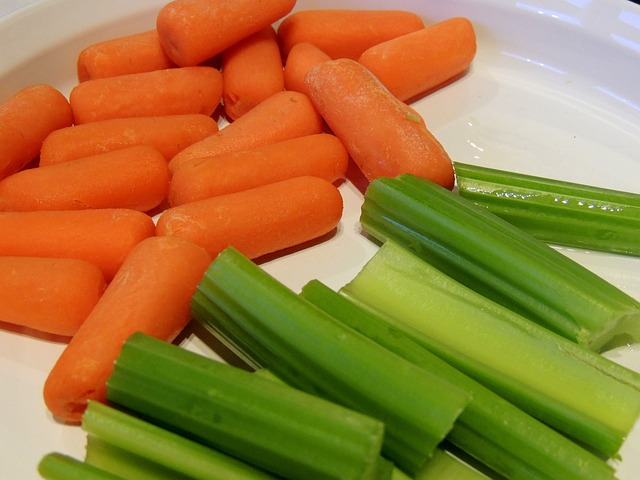Your kids are at the dinner table and picking on the carrots and celery in the salad. Before long they are feeding it to the dog. This happens every time and is a common sight. But have you ever thought, can dogs eat carrot and celery?
Yes, your dogs can eat both carrots and celery. These are one of the few vegetables that your pet can share with you but in very few quantities and not as a daily diet. They are carnivorous animals and have no use for vegetables in their diet. Hence it is better if it is considered as a snack or a treat and in moderation.
Healthy carrots and celery for dogs
Carrots and celery contain valuable nutrients especially celery which is a superfood.
Your dog can benefit from having these included in their diet. In fact, celery is sometimes added to dog food since it has very less calorie and rich in vitamins and minerals.
Carrots, on the other hand, are also low calorific yet have beta carotene and high in fibre.
Can I Give Carrots to My Dog?
Dogs can eat carrots for the same reason that humans do.
They are rich in fibre and have beta-carotene both of which can be absent in regular pet foods.
ASPCA approves of this and recommends the same as a healthy snack option instead of dog biscuits.
If you are looking for a healthy way to treat your pet, carrots are the way.
In addition, the hard texture of the vegetable is also good for their teeth.
Cut the vegetable into bite-sized pieces that are chew-friendly to make them more attractive to your dog and easier to eat.
Just because they are healthy doesn’t mean you give them a bowl full or even a hand full.
Moderation is the key when it comes to these snacks.
Two or three pieces of the orange vegetable are enough for your pet. Any more than that can cause diarrhea in dogs due to their high fibre content.

Can I Give Celery to My Dog?
Celery contains useful and beneficial vitamins and minerals that are can be missing from the daily diet f many dogs.
The vegetable is also abundant in water content and hence low in calories.
Moreover, it is also a rich source of vitamin K which helps to build strong bones and teeth.
Celery also has potassium levels that are equal to that present in banana. Hence it is ideal for older dogs that may need extra nutrition alongside their daily food.
It is a good idea to cut celery into bite-sized pieces when feeding to the dog so that it doesn’t cause a choking hazard.
Also, it is important that you give just a few bites and not any more than that.
While celery is good for dogs, the celery leaves aren’t so make sure to skip when feeding the vegetable to your pet.
And as with carrots, too much celery can cause diarrhea and also frequent urination.
How Do I Handle Diet Changes for My Dog?
As a dog owner, you should introduce any new food slowly and gradually to your pet.
Start slowly with one vegetable and just a bite or two to see how he takes it.
If your dog gets a stomach upset after eating carrots or celery or any vegetable for that matter, stop giving him and do not attempt again.
Not all dogs are the same, and it doesn’t mean that if one dog tolerates vegetables, your other dog should too.
If you have any doubt contact your vet and get his advice before making any changes to his diet. You can also consult him on the vegetables you can feed your dog.
Are there any drawbacks to giving carrots and celery to dogs?
As with all things, if you feed these vegetables too often or in large amounts, then your dog could become unwell.
Dogs are carnivores and require a meat based diet to enjoy the best health and if they are fed a predominantly vegetarian diet then their well being could be affected.
Don’t overdo the carrots and celery and that goes for other vegetables and fruits too.
An occasional treat will be enjoyed by most dogs.
Final Words
Carrots and celery are fine for your dog.
Introduce them gradually to your dog’s diet by either mixing them into their normal food or by simply giving them a stick of celery or a carrot to chew on.
Don’t overdo these foods and, if your dog displays any symptoms then stop feeding.
As with all things if you have any health concerns or are unsure then you should talk with your vet to get their advice.




